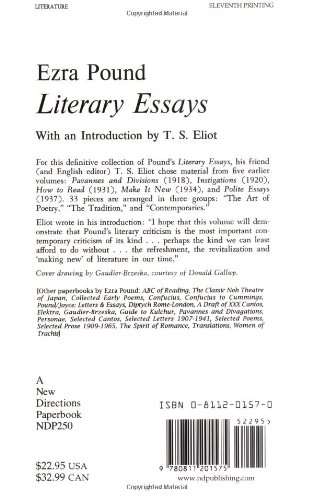Customer Services




Literary Essays of Ezra Pound
T**S
Ezra Pound's Literary Essays are of the highest value.
There are very few literary essays that could compete with this; all the stereotypical rubbish about writers and writing are vetoed here. Reading this can make you a better writer.
M**R
Excellent service
Excellent service. Arrived as described.
S**L
Good introduction to Pound but requires a supplement
Inarguably America's most prolific poet and essayist, Ezra Pound is probably the most influential of all American poets and quite possibly the best. This collection of essays gives a more representative view of the complete thinker in all fields of knowledge than does the collection assembled by T. S. Eliot. Pound comes out of the line of Donne and Browning--more the musician of words than the painter, more an inhabitant of time than of space. He was an awesome "discourse-machine" (even before word-processing), whose syntactical energies, whether in verse or prose, are often fascinating and provocative if not occasionally compelling.Having survived Browning's "Sordello," I thought I'd devote attention to some of the ideas that led to "The Cantos." Soon, it becomes clear that a fuller understanding of the poet requires equal attention to his economic and political ideas. Too many discussions of Pound simply apologize quickly and awkwardly for his anti-Semiticism, and move on to "safer" selections from the poetry. Pound may at least deserve credit for the courage of his convictions (like a suicide bomber), regardless of how wrong-headed they were. (He did try in vain to recant abhorrent, hateful words that, having gone out over the radio waves, were indelible and on the record.) Still, some would argue that his printed words are equally on the record, and if so it's necessary to give his writings their due (admittedly often ramblings) Selected Prose 1909-1965 in order to come to a better understanding of the most notoriously difficult poem by an American poet.Rather than attempting to understand the crowning achievement by a man-of-letters who appeared to take too literally Shelley's conflation of poetry and politics, there continues to be an aversion to Pound--whether because of political correctness or genuinely felt passion. At the time, the publication of the "Cantos" was vigorously opposed by respected Jewish-American literary critics (Karl Shapiro) and political leaders (Sen. Jacob Javits), and the memory of his anti-capitalist radio broadcasts and his endorsements of Hitler and Mussolini understandably overshadowed his later words of retraction and repentance (along with his offer to President Truman to negotiate a peace with Japan). Even his mental break-down and subsequent insanity--following his arrest for treason and, within two weeks of Germany's surrender, imprisonment in a seething-hot, perpetually-illuminated, 6-by-6-foot steel cage--was treated as one more piece of evidence against him rather than admitted as any sort of extenuating circumstance. Yet it was this artist/genius-monster who, perhaps more than any other single individual, changed the landscape and built the architecture of 20th century literature in English. By 1959 he had fallen into a depressive state, and by the time of his death in 1972 he had suffered perhaps the worst of all injuries to a man of words--not controversy or denunciation but neglect and indifference (I don't even recall the announcement of his death). As Dylan Thomas so memorably puts it, he was one of those "whose words had forked no lightning."Of course, the horrors of Nazi Germany testify to the impossibility of any one of us with a conscience forgiving let alone "excusing" Pound: that act must be left to extra-human powers. On the other hand, the "piling on" seems to have run its course, and the time for reassessing the man, his ideas, and his art--necessarily of an organic whole and inseparable--would seem to be riper than ever. If so, this collection of essays along with an anthology of his political-economic prose may be a better preparation for understanding Pound than any number of summaries and general third-person introductions. It's Pound's political-economic essays on the subject of "usury" that shed the most illuminating light on the connection between the American and Italian authors of literature's two most famous "Cantos."As misguided as Pound's choice of political leader was, the path that led him there was one addressing the disparity between the spiraling cost of goods and the diminishing return to the workers (today's "middle class"). His ideas were heavily indebted to From Debt To Prosperity: 'Social Credit' Defined and, above all, the economic theories of E. H. Humphrey: Economic Democracy and Credit-Power and Democracy (Classic Reprint) . But the inspiration of his crowning life's work, The Cantos of Ezra Pound , was the literary prototype constructed by Danté who, though not in the graces of the Catholic Church, remained a more devout Christian to many of his readers than any of the corrupt Popes and church officials found in his poetry. Of prime interest (pun optional) in Danté's most perused work, The Inferno , is a brief, easily missed, passage devoted to the placement and pitiable position of the usurer-plutocrats in the penultimate circle of lower hell. Above all, Pound carried an obsessive hatred of all those who would "make money with money." Their sentencer's attempts to explain their crime are not always coherent or persuasive, issuing from the mouth of a mad man. Yet there's no mistaking the severity of their transgression and its punishment. It's a place no sane man would wish to be. (I'll leave it to readers to add, but only if they see fit, that "it takes one to know one.")
A**R
-
The book condition should be "acceptable," not "very good."
M**E
Good Edition!
Purchased for a Grad Class. Good Edition!
A**R
Hanks to you, Ezra!
The book as the source for those who are reading and rereading the high samples of world literature. Nice present!
H**R
explainer
in his own words
S**L
Five Stars
Amazing book!
Trustpilot
4 days ago
2 days ago